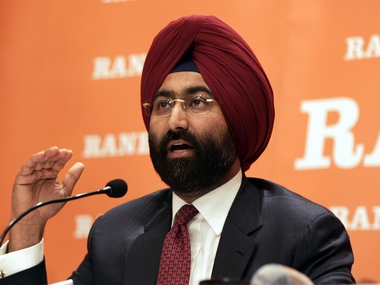Malvinder Singh, one of the Singh brothers from whom Daiichi bought Ranbaxy, has given a clean chit to himself yesterday. He contradicted all the charges made by not only Daiichi Sankyo but whistle blower Dinesh Thakur.
In his US testimony, Thakur had said the company board, when it met in Thailand, was informed of the malpractice but the members did nothing. According to Malvinder, no board meeting was held in Thailand at all. “He (Thakur) saying it in testimony does not mean it is the fact,” he has told the Business Standard.
Daiichi had on Wednesday said that “certain former shareholders of Ranbaxy concealed and misrepresented critical information concerning the US Department of Justice and FDA investigations”. It also indicated it will take legal recourse.
Malvinder, however, has said Daiichi was updated about all the developments. According to him, Daiichi has not been able to grow the Indian generics maker, which got into trouble soon after getting acquired by the Japanese major, to the potential.
What is in store
Despite all these denials, Malvinder and Shivinder Singh may be in for a little bit of trouble and the way out is unlikely to be easy. There are chances that Daiichi may indeed go ahead with the legal case.
Three likely scenarios discussed in various news paper reports are as follows:
[caption id=“attachment_811709” align=“alignleft” width=“380”] Malvinder, however, has said Daiichi was updated about all the developments.[/caption]
Impact Shorts
More Shortsa) Daiichi is likely to send a legal notice to the Singh brothers alleging concealment and misrepresentation of key information. They may seek huge compensation from former promoters as the incident has impacted the brand image of Ranbaxy adversely, a Times of India report said.
b) Daiichi can even file a case or arbitration against the Singh brothers. “In an M&A deal, compensation or damages can be sought by the acquirer from the seller under the representation and warranty clause, in case there is a breach or a misrepresentation of any sort,” the ToI report said quoting sources.
c) Even capital market regulator may come into the picture, a Business Standard report said. If Daiichi’s allegations are proved correct, Sebi can take action against the former promoters under two provisions: 1) takeover code violation and 2) fraudulent trade practices norms.
As per Sebi’s Prohibition of Fraudulent and Unfair Trade Practices Regulations, concealing material facts to facilitate trading in securities is a fraudulent practice, Somasekhar Sundaresan, partner, J Sagar Associates, has been quoted b saying in the BS report.
Moreover, while making an open offer, it is mandatory for the acquirer to disclose all price-sensitive details. This is likely to have happened in the case of Ranbaxy as Daiichi itself is saying that it was unaware of some of the details.
Apart from all these, there is one more for which Ranabxy and its former promoters should be held responsible for: erosion of credibility of the Indian executive.
According to another report in the Business Standard, a Ranbaxy source has said as the company is now focusing on getting a clean image, it will induct more Japanese at the senior executive level.
“A few more Japanese executives are likely to be brought on board in the Indian subsidiary to ensure compliance in processes procedures,” the company source has been quoted as saying in the report.
This is a telling comment on how the episode has eroded the credibility of Indian executive and accentuated the faulty Indian system of checks and balances.
Will the authorities probe and, if found guilty, hold the former Ranabxy promoters responsible for tarnishing the image of the Indian professionals and utilising the faulty system to their advantage?
Will the case make the government realise that good manufacturing practice is not only applicable to the Americans, but to Indians too? Will this prompt the law makers to fix the system? If it indeed does, it will be good for the people and the industry.
On the contrary, if it is again a “chalta hain”, the consequences are going to be dangerous, especially in this case because it involves medicines. At stake is our health.


)

)
)
)
)
)
)
)
)



